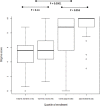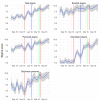Stigma and Ebola survivorship in Liberia: Results from a longitudinal cohort study
- PMID: 30485311
- PMCID: PMC6261413
- DOI: 10.1371/journal.pone.0206595
Stigma and Ebola survivorship in Liberia: Results from a longitudinal cohort study
Abstract
Background: Survivors of the 2014-2016 West Africa Ebola epidemic have been reported to suffer high levels of stigmatization after return to their communities. We sought to characterize the stigma encountered by a cohort of Ebola survivors in Liberia over time.
Methods: Ebola-related stigma was assessed from June 2015 to August 2017 in 299 adolescent and adult Liberian Ebola Survivor Cohort participants at three month intervals using adapted HIV stigma scales scored from 0 to 10 according to the proportion of answers indicating stigmatization.
Findings: The median time from Ebola Virus Disease (EVD) to study entry was 393 days (IQR 336-492). Participants (43% female) had a median age of 31 (IQR 25-40) years. Mean self-reported stigma levels were greater at baseline (6.28 ± 0.15 [IQR: 4.38-8.75]) compared to the first post-baseline visit (0.60 ± 0.10 [IQR: 0-0]; p<0.0001). During follow-up, stigma levels were stable. Baseline stigma significantly increased during enrollment and following clusters of Ebola re-emergence in Liberia. Survivors encountered primarily enacted and perceived external stigma rather than internalized stigma.
Conclusions: Ebola-related stigma was prevalent among Liberian survivors more than a year after EVD recovery. Self-reported stigma was greater in the period before cohort enrollment; however, some degree of stigmatization persisted years after EVD. Transient rises in stigma were observed following episodic Ebola re-emergence of EVD in Liberia. During future EVD outbreaks, enhanced public health interventions designed to prevent and mitigate Ebola-related stigma that is enacted and external should be implemented to support survivor recovery and community re-integration.
Conflict of interest statement
The authors have declared that no competing interests exist.
Figures




References
-
- World Health Organization. Ebola Situation Report. 15 April 2015. Available from: http://apps.who.int/ebola/current-situation/ebola-situation-report-15-ap...
-
- Vetter P, Kaiser L, Schibler M, Ciglenecki I, Bausch DG. Sequelae of Ebola virus disease: the emergency within the emergency. Lancet Infect Dis 2016. June;16(6):e82–e91 10.1016/S1473-3099(16)00077-3 - DOI - PubMed
-
- Burki TK. Post-Ebola syndrome. Lancet Infect Dis 2016. July;16(7):780–781. 10.1016/S1473-3099(15)00259-5 - DOI - PubMed
-
- Van Bortel T, Basnayake A, Wurie F, Jambai M, Koroma AS, Muana AT, et al. Psychosocial effects of an Ebola outbreak at individual, community and international levels. Bull World Health Organ 2016. March 1;94(3):210–4. 10.2471/BLT.15.158543 - DOI - PMC - PubMed
-
- Hugo M, Declerck H, Fitzpatrick G, Severy N, Bamba-Moi Gababi M, Decroo T, et al. Post-Traumatic Stress Reactions in Ebola Virus Disease Survivors in Sierra Leone. Emerg Med Open Access [Internet] 2015. Available from: https://www.omicsonline.org/open-access/posttraumatic-stress-reactions-i...
Publication types
MeSH terms
Grants and funding
LinkOut - more resources
Full Text Sources
Medical

